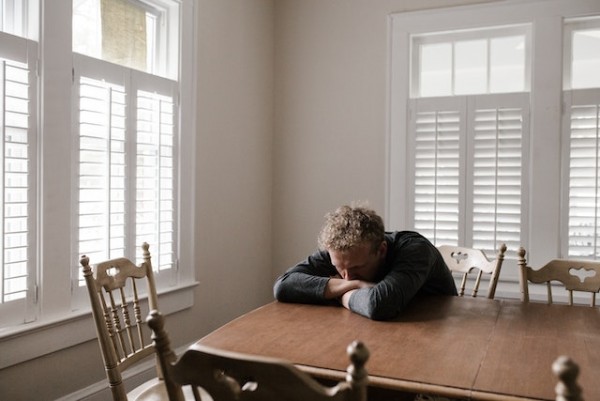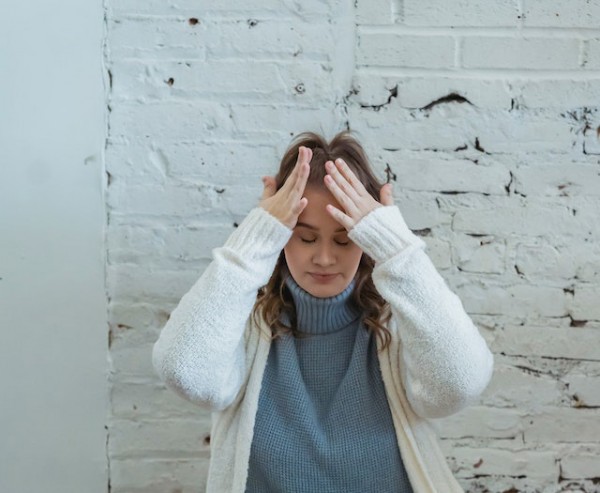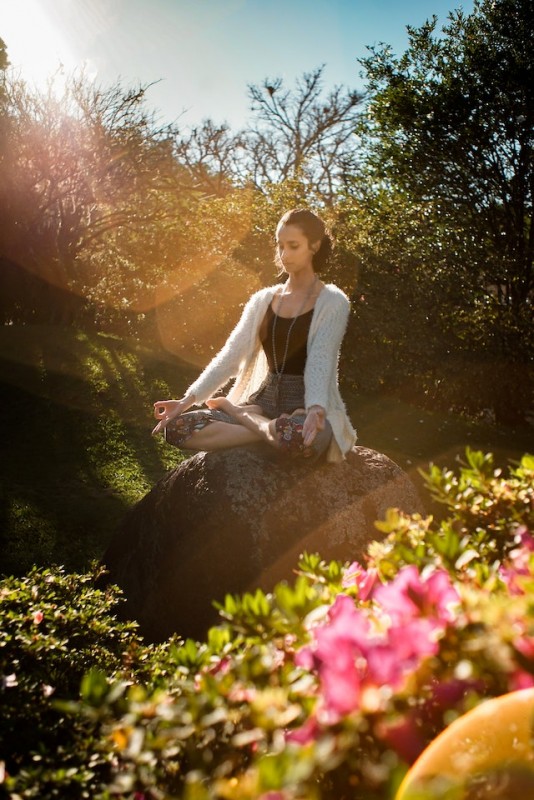Addressing Anxiety from EVERY Angle (Anxiety Root Cause)
ANXIETY, WORRY, and FEAR.
What does it mean to have anxiety? What are the symptoms? Why is it becoming more common? What are answers? There is an in-depth dive into common ideas and treatments out there for anxiety, and which ones might help depending on the type of anxiety.
Disclaimer:
The content within this blog is not intended to diagnose or treat any disease or be a substitute for medical advice, diagnosis, and/or treatment, but is for informational purposes only. I’m not a doctor, psychologist, or medical professional, nor do I claim to be. I’m simply sharing the resources and experiences that I have found. Please consult your doctor or another qualified health provider on any health situations and/or conditions you are experiencing. Read our full disclaimer for more information.
 What might possibly be the worst part of anxiety, isn’t actually the anxiety itself, it is the secondary anxiety that results from the anxiety itself. It is worse enough to feel the anxiousness about everything, but then you also get that thought, “I will always have this anxiety. I can’t conquer it. It will always be there” or “I can’t heal. My pain will always be there.”
What might possibly be the worst part of anxiety, isn’t actually the anxiety itself, it is the secondary anxiety that results from the anxiety itself. It is worse enough to feel the anxiousness about everything, but then you also get that thought, “I will always have this anxiety. I can’t conquer it. It will always be there” or “I can’t heal. My pain will always be there.”
You might feel anxiety about trying something new and it not working, you are afraid of being disappointed, you are afraid of wasting your money, you are too afraid to leave the house to get the treatment, and/or you are afraid of making bad choices. Your anxiety tells you there is not a solution, so you don’t even try.
Maybe it has been that way all your life… so you think, “there is no way to fix it!” ANXIETY LIES!
Symptoms of Anxiety
There are many symptoms of anxiety. I personally always thought anxiety showed up as something like a panic attack because I always heard of people with anxiety talking about struggling to breathe. So I thought, “I’ve never been through that I’m not sure what anxiety feels like.” But the truth is, I have had chronic anxiety in the past that I thought was normal, anxiety from pain, and anxiety in many different scenarios. I understand some of the challenges.
I think most of us have experience some form of anxiety in our lives. It is only natural as human beings to worry at some point about something. But when we have anxiety that is intruding on our everyday lifestyle, that shows up frequently, or is our normal constant state, it is then a problem. For me, it was a problem.
Mental Symptoms of Anxiety: Feeling disconnected from the world, worrying about future events, uncontrollable and excessive worrying, being spacy, needing constant reassurance, avoidance, chronic procrastination, easily irritated, constant exhaustion, indecisiveness, inability to concentrate, etc.
Physical Symptoms of Anxiety: shortness of breath, tight chest or tension in muscles, light headedness, trembling, restlessness, panic attacks, stomach cramps, headaches, loss of appetite, nausea, hot flashes, sweating, rapid heartbeat, inability to relax, hyperventilation, etc.
Here is a rating scale that may help you to see if your anxiety is minimal, mild, moderate, severe or debilitating ANXIETY SCALE
 Anxiety is Becoming More Common. WHY?
Anxiety is Becoming More Common. WHY?
Anxiety is becoming more common and I’m not surprised. There are a lot of reasons to be anxious.
I don’t think school systems properly prepare kids for the real world and many people agree with this. From the time we are young, we are pushed to fit in not stand out, not be open-minded, and to not analyze problems and really break them down to make decisions and find solutions. Along with an education that doesn’t helps us figure out who we are, we don’t get taught how to manage all the things that come with being an adult.
The real world is constantly trying to manipulate your mind to make money off of you.
The world is moving too fast.
People are too busy – they are not connecting the way they used to.
There is not enough understanding and empathy.
Our healthcare system is abysmal (especially for those with chronic health issues).
Chronic health issues are becoming more common, and frankly they create anxiety.
Self-care is just starting to become a big thing, but people are still struggling to really implement it into their lives.
Our value in this world is often determined by what we can accomplish professionally or raising kids, but that does not define someone’s worth. This is also damaging to those with chronic illness who can’t work or can’t have kids. The need for wellness coaches and lifestyle coaches is rapidly growing because people are unable to figure out who they are and where they fit in this world.
There are a lot of broken things in this world that need fixing.
This has been on my mind for a while… what are real solutions for dealing with anxiety?
Finding Answers for Anxiety
I think anxiety is often pushed under the rug as not being a big deal, or that people are just supposed to change their thinking and that just solves it. Some people think anxiety can be fixed by just doing some mental exercises to stop fear from taking over. While that may be the case for some, it is not the case for everyone. Let’s look at some of the strategies out there to help with anxiety starting with the simplistic ones and then discussing the more complex ones.
I have found a ton of articles through Pinterest on how to manage anxiety including
- Breathing
- Meditation
- Journaling
- Affirmations
- Challenging Thoughts (ABCDE)
- Shifting Focus
- Imagining Calming Situations & Thinking Calming Thoughts
- Naming things you can (see, touch, hear, feel, and smell)
- Prayer
- Eating Calming Foods
- Exercise
- Decluttering
- Nature (walking and grounding)
- Supplements
- Music
- Sleeping more
- Calming baths
The question is… Do these things actually work?
Well, it does all depend on what is causing your anxiety. It also depends on how bad your anxiety really is.
Do you just get anxiety every time you are stressed out?
Managing Stress with Self Care
.jpg) The first thought is… Do you have a toolbox of strategies that you turn to when you are stressed? Things like: walking or grounding in nature, calming baths, sleeping more, listening to calming music, journaling, or decluttering, can all help with stress.
The first thought is… Do you have a toolbox of strategies that you turn to when you are stressed? Things like: walking or grounding in nature, calming baths, sleeping more, listening to calming music, journaling, or decluttering, can all help with stress.
From reading some research recently with how the brain works, you can rewire the brain over time to react more calmly to stressful things. I have read and researched a bit on meditation, and that checks out: that the more you meditate, the easier it is to deal with stressful situations.
Could Meditation Help?
Imaging studies show that mindfulness soothes the brain patterns underlying pain and, over time, these changes take root and alter the structure of the brain itself, so that patients no longer feel pain with the same intensity (Penman, 2015). Regular meditation has been shown to increase alpha waves – your relaxation brain waves — and reduce beta waves – the brain waves of active thought and learning (Meda, 2019).
Also used to regulate brain waves is Neurofeedback, a type of Biofeedback that can help with anxiety. Neurofeedback training examines brainwaves, finds the abnormalities and then creates a signal to fix the abnormality and trains the brainwave back to normal patterns.
 This will probably be more helpful to those who don’t understand the cause of their anxiety. Because if you keep revisiting that same scenario that causes you anxiety or that same person, you haven’t fixed the root of the problem.
This will probably be more helpful to those who don’t understand the cause of their anxiety. Because if you keep revisiting that same scenario that causes you anxiety or that same person, you haven’t fixed the root of the problem.
Some people struggle to meditate. I don’t think it is for everyone. Luckily, they are other things to try. If you are able to use some of these methods of journaling, affirmation, challenging thoughts, and other mental strategies on a regular basis and they help with the anxiety in the moment, over time it can become automatic to the point where you just flip your way of thinking and your emotional response automatically. Your brain is able to create new neurological connections with practice. So you can shift your thinking patterns.
Yoga or other exercises could help a bit too, especially if you are typically not very active. Yoga uses some of the concepts of meditation, breathing, and movement of the body.
However, depending on how bad your anxiety is, these strategies might not do a whole lot for you. For example, if your anxiety stems from a trauma, or an unconscious perception you have about yourself and the world, this might not work. But these things can still help, so they are still worth doing! I talk a bit more about trauma here: Addressing Anxiety from EVERY Angle (Anxiety Root Cause).
Could Prayer Help?
Some people turn to prayer and find it helps with anxiety relief, and many have probably found complete peace through prayer. However, don’t feel discouraged if prayer alone doesn’t heal your anxiety completely. There is probably something that needs to be learned or worked through. It all depends on what is the root of your anxiety. Maybe there is a need to heal underlying trauma, which I think could be the case for a lot of people.
If praying doesn’t work, it isn’t because God isn’t listening. Keep on praying. God may be providing a solution in another way.
When you feel yourself becoming anxious do you pray? Do breathing exercises? Try tapping? Or try some affirmations? Sometimes it might be helpful to do multiple things.
Could Diet and Supplements Help?
 Food can certainly have an impact on stress levels. Eating lots of sugar, processed carbohydrates, and greasy food can leave you feel fatigued, give you brain fog, or even some pain, and then having to deal with something stressful may cause anxiety. But is it the reason for anxiety? Maybe if your diet is super unhealthy. Could it help? Yes, but it might not be a fix.
Food can certainly have an impact on stress levels. Eating lots of sugar, processed carbohydrates, and greasy food can leave you feel fatigued, give you brain fog, or even some pain, and then having to deal with something stressful may cause anxiety. But is it the reason for anxiety? Maybe if your diet is super unhealthy. Could it help? Yes, but it might not be a fix.
Supplements can help if your anxiety is tied to a vitamin or mineral deficiency. Vitamin B1 is the most common vitamin linked to anxiety. There are also supplements you can take specifically for anxiety. But it will just manage the problem, it likely won’t fix it. Also, anxiety supplements don’t work for everyone.
Do you get anxiety only in certain situations?
Being in crowded places? Dirty places? Small spaces?
Do you only have anxiety when you are home?
I think it is okay to avoid certain things if they cause anxiety, but if they are affecting your regular everyday life you need to get the root of the problem. Can you get an organizer to help you declutter your home and find better systems? Can you get someone to help you clean? If you are struggling with social anxiety, then you might consider a therapist. If you have an irrational fear of something, maybe it is underlying trauma.
Is a person in your life causing you anxiety?
Consider how your thoughts and emotions change around certain people because it could be subconsciously causing you problems.
There are many different scenarios as to why the people in your life may cause you anxiety. You might just be dealing with toxic people that you need space from. Your relationships could be causing you anxiety due to poor communication. Are you being clear on your boundaries?
Do you have kids that have too much energy, behavioral problems, or health issues? Are you getting enough of a break from being a parent?
These are all things that could maybe be worked through with some therapy, a life coach, or maybe worked through with a close friend, etc.
Do you feel anxious all the time? Do you wake up anxious and go to bed anxious?
Are you unhappy with your life circumstances?
Does your work cause anxiety?
Anxiety is such a challenge because you may be happy with your life and still have anxiety. Sometimes everything can be going right in your life and you can still struggle. However, being unhappy with your life circumstances can definitely cause random anxiety attacks. Do you generally feel trapped? Have this constant fear of the next bad thing that is going to happen? Or generally feel like life can’t change for you? I say this as someone who knows that feeling. I’ve had that feeling. A life coach might be a good idea if you can’t figure out how to make the appropriate life changes. Therapy could help if it feels like a deeper issue.
The mind is super powerful. You can get trapped in your own head. Sometimes to move forward you have to tell yourself that it’s not your fault. Even if you are holding onto something that is your fault, forgive yourself. In order to really make changes, you have to really love on yourself. Moving forward with the self-care that is needed begins with saying “I deserve it.” We all deserve it. Then if you believe you deserve it, you can find someone to help you find your way. We have awesome resources on different types of therapists and information on wellness coaches.
Anxiety Combined with Insecurity
Anxiety and Insecurity together are a recipe for disaster.
 You feel bad things keep happening to you and it must be your fault.
You feel bad things keep happening to you and it must be your fault.
You feel like maybe it’s just you, maybe there is something inherently wrong with you.
You feel like you don’t deserve to be heard to get the treatment you deserve.
You can’t express yourself.
You fear expressing yourself because the world has taught you it is not okay.
Not loving yourself can cause anxiety! The world is way crueler when you don’t love yourself. The world will often make you feel worse about yourself and kick you around. The world will often just kick you even though you are already on the ground trying to figure out how to get up. I know from past experience; when you don’t love yourself enough, the world is great at giving you more reasons not to love yourself. People treat you worse when your insecurities show.
You can’t rely on things outside of yourself to help, you have to do the inside work. It is way harder to survive the world, if you don’t love yourself. I know because I’ve been there, and now I’m on the other side. But there are coaches and therapists that truly do want to help.
Check out other Hope Instilled blogs on self-love and self-care, if that is something you need to figure out first:
In-Depth Advice: How to Improve Self-Esteem
Managing Poor Self-Esteem with Chronic Illness
Discovering Who You Are & Loving that Person (Part 1)
Creating Yourself & Overcoming Society’s Stigmas (Part 2)
The Importance of Self Love When Chronically Sick
Do you just feel anxious when the pain comes?
I have dealt with anxiety from pain, and I have dealt with anxiety from unresolved trauma. I’m very familiar with both. Make sure you know if you are suffering with one of those or both to know what direction to go in first for your anxiety.
Recently I was reading The Mind Body Toolkit, which talks about how your body is listening to your thoughts and what you say out loud. So I have learned that you can’t say negative things about your pain or the pain will get worse. You have to say how you want to feel vs talking about how much pain you are in. When rewiring your neurological patterns, you can’t tell yourself “I have anxiety,” instead tell yourself “I want to be calm and relaxed” and think calming thoughts. I’ve been reading on how your body is listening. So if you tell yourself you have anxiety, you are going to feel more anxiety. State what you want to feel vs confirming the pain or feeling that you are experiencing.
That doesn’t mean you need to be positive, you just have to accept the situation as is. When you put all your focus on the pain, you will feel it more intensely. Over time, using this tool along with other tools in the book are supposed to work in rewiring your neurological patterns (as mentioned with meditation). This is supposed to help with healing. This is hard thing to explain, so I recommend getting the book to really understand it.
Hold onto hope, don’t believe what your anxiety is telling you, it is a liar. Hoping you find some healing!
__________________________________________________________________________
References
Penman Ph.d., Danny. (2015 January 9th). Psychology Today/Can Mindfulness Meditation Actually Really Reduce Pain and Suffering? Retrieved from:
Meda, Karuna. (2019, November 26). Thomas Jefferson University/How to Manipulate Brain Waves for A Better Mental State.
Retrieved from: https://nexus.jefferson.edu/science-and-technology/how-to-manipulate-brain-waves-for-a-better-mental-state/
<<-- Back to Renewed Living Blog Email to a friend
